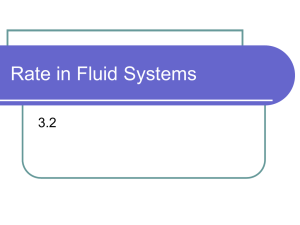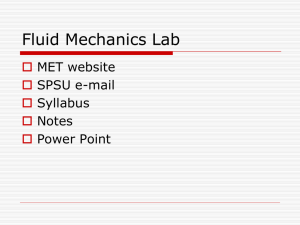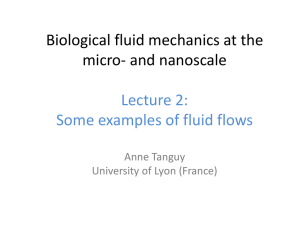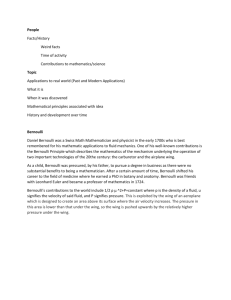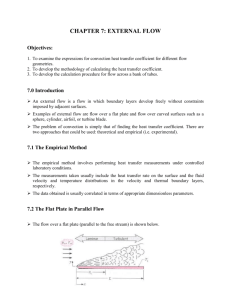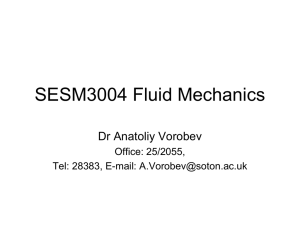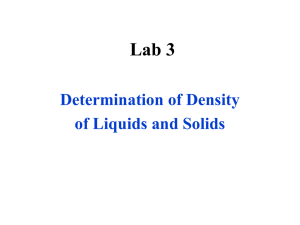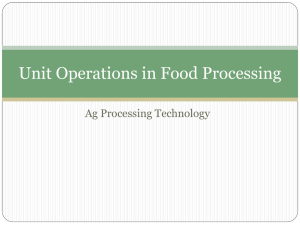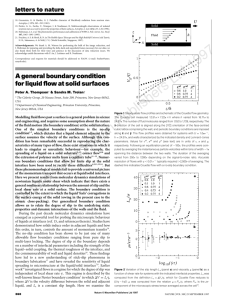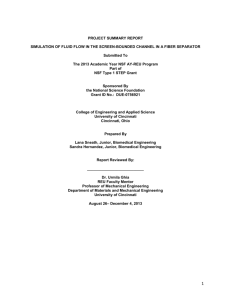lesson.2.2
advertisement
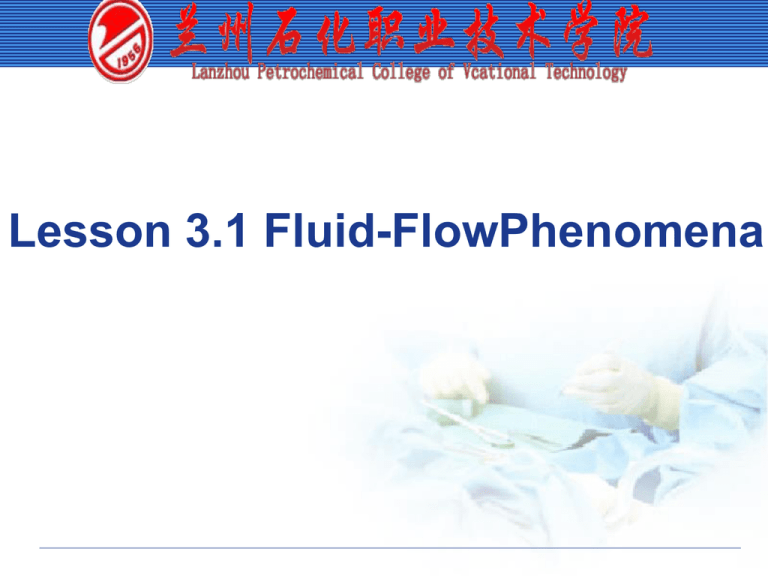
Lesson 3.1 Fluid-FlowPhenomena content 1 words 2 Expressions and Technical Terms 3 Text Words 流体流动 fluid [`flu:id] n . 流体 boundary[`baundri] n. 边界,疆界,限界 negligible[`negliʤәbl] adj. 可以忽视的;无足轻重的(人);不足取的;很小的, 微不足道的 其他 behavior [bi`heivjә:] n. .行为,品行;举止,态度,举动,表现,行动 incompressible [im͵kәm`presbl] a. 不可压缩的 viscosity [vis`kɔstiti] n. 速度,速率 conservation[͵kɔnsә`veiʃәn] n. 【物理学】守恒,不灭 characteristic[͵kærәktә`ristik] n. 有特性的;表示…特性的,…特有的 circulation [͵sә:kju`leiʃәn] n . 循环,环流 Expressions and Technical Terms 对应职业岗位 fluid flow 流体流动 规格 shear stress 剪切应力 ideal fluid 理想流体 potential flow 势流 conservation of mass 质量守恒 irrotational flow 无旋流 solid boundary 固体边界层 fluid mechanics 流体力学 adjacent to 与…相毗邻 boundary layer 边界层 text The behavior of a flowing fluid depends strongly on weather or not the fluid is under the influence of solid boundaries. In the region where the influence of the wall is small, the shear stress may be negligible and the fluid behavior may approach that of an ideal fluid, one which is incompressible and has zero viscosity. 流体的流动行为主要取决于流体是否受固体边界层的影 响.在边界层影响最小的区域,剪切应力很小,流体的行为就 接近于理想流动状态,理想流体是不可压缩的,黏度为0的流 体 text The flow of such an ideal fluid is called potential flow and is completely described by the principles of Newtonian mechanics and conservation of mass. Potential flow has two important characteristics : (i) neither circulations nor eddies can form within the stream , so that potential flow is also called irrotational flow , and (ii) friction cannot develop , so that there is no dissipation of mechanical energy into heat . 这种理想流体的流动称为势流.这种流动可以用牛顿机械 定律和牛顿质量守恒定律来描述.势流有两个主要特征:⑴ 在细流中既无环流也无涡流的产生,所以势流也称为无旋 流.⑵在势流中摩擦不存在,因此没有机械能转化为热能的 散逸. text Potential flow can exist at distances not far from a solid boundary. A fundamental principle of fluid mechanics, originally stated by Prandtl in 1904, is that, except for fluids moving at low velocities or possessing high viscosities, the effect of the solid boundary on the flow is confined to a layer of the fluid immediately adjacent to the solid wall. 势流可以在距离边界层不远的地区存在.由1904年提出的 流体力学的基本原理就是除非流体在较低速度下流动或流 体中有很高黏度,固体边界层对流体流动的影响就局限在 紧贴与边界层附近的流体上,这个层称为边界层 text This layer is called the boundary layer, and shear forces are confined to this part of the fluid. Outside the boundary layer, potential flow survives. Most technical flow processes are best studied by considering the fluid stream as two parts, the boundary layer and the remaining fluid. In some situations such as flow in a converging nozzle, the boundary layer may be neglected, and in others such as flow through pipes the boundary layer fills the entire channel, and there is no potential flow. 剪切应力仅局限于边界层的流体.在边界层的外部势流存 在.大多数的流体流动过程最好是将流体分为两部分来研 究,即边界层和剩余的流体部分.在某些情况下,如流体在收 敛的喷嘴中流动,边界层可以忽略不计;在其他情况下,如在 text Within the current of an incompressible fluid under the influence of solid boundaries, four important effects appear: (i) the coupling of velocity–gradient and shearstress fields, (ii) the onset of turbulence, (iii) the formation and growth of boundary layer, and (iv) the separation of boundary layers from contact with the solid boundary 在固体边界层的影响下的不可压缩流体的流动主要有四个 方面的影响:⑴速度梯度和剪切立场的叠加,⑵湍流的产生, ⑶边界层的形成和长大,⑷边界层和紧贴便捷层的分离. text Laminar flow and Turbulence It has long been known that a fluid can flow through a pipe or conduit in two different ways. At low flow rates the pressure drop in the fluid increases directly with the fluid velocity, fluids tend to flow without lateral mixing and adjacent layers slide past one another like playing cards 层流和湍流 众所周知流体通过管子的流动可以有两种不 同的方式.在低流速下,流体中的压力降直接随着流体速度 的增加而增加,流体趋向于没有横向混合就像玩牌那样的 相邻层间的滑动, text There are neither cross-currents nor eddies, this regime is called laminar flow. At high rates it increases much more rapidly, roughly as the square of the velocity, turbulence appears and eddies form. The distinction between the two types of flow was first demonstrated in a classic experiment by Osborne Reynolds, reported in 1883. It is shown in Fig 8 在这里既没有横向混合也无涡流,这种流动称为层流.在高 速下压降随速度增加很快,大概是与速度的平方成正比.湍 流出现摩擦形成层流和湍流间的区别第一次由O.R在1883 年的典型实验中得以证实,这个实验如图8. text Fig 8 Reynolds’ apparatus for tracing patterns
